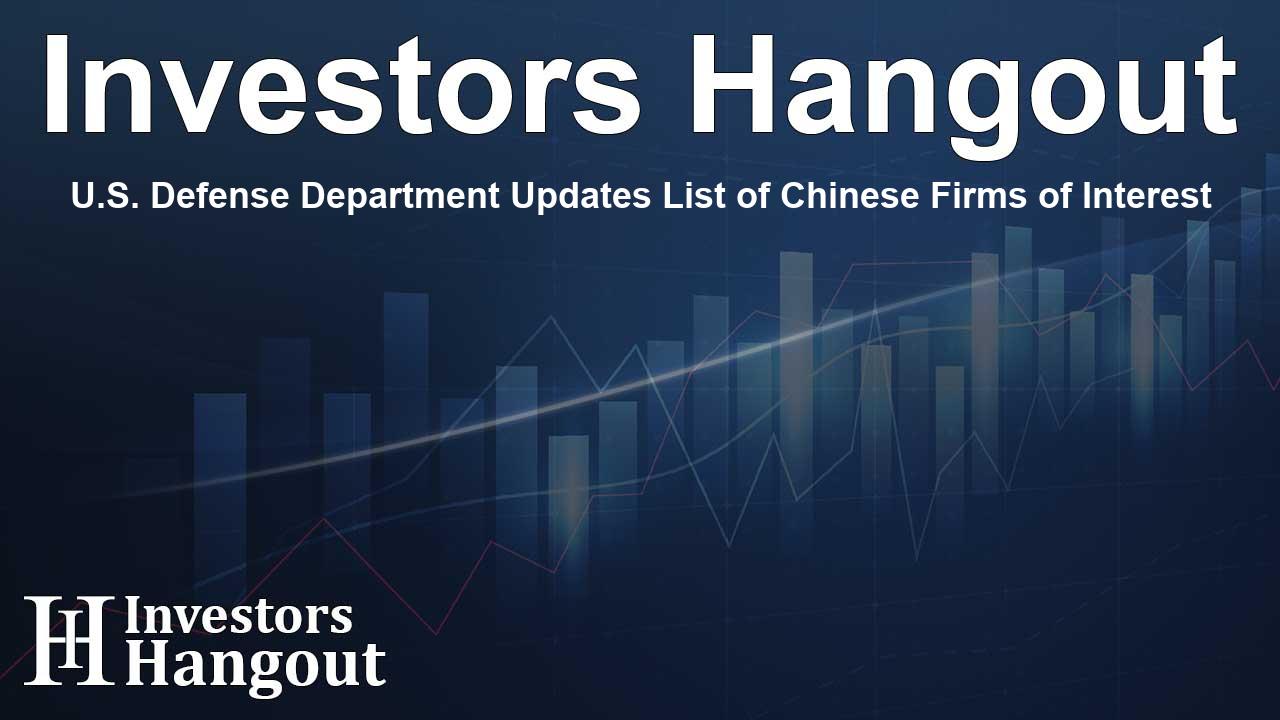U.S. Defense Department Updates List of Chinese Firms of Interest

Important Developments in U.S.-China Relations
The U.S. Defense Department has recently undertaken significant actions regarding its relations with Chinese companies. This move reflects the increasing scrutiny on businesses that may have connections to military operations in China. By expanding its list of firms associated with these activities, the U.S. government aims to address concerns surrounding national security.
Tencent and CATL Join the List of Companies
In its latest update to the designation list, the Defense Department named notable Chinese companies such as Tencent Holdings and CATL. Tencent, well-known for its gaming and social media platforms like WeChat, has drawn attention due to its vast digital footprint and influence. Meanwhile, CATL, a major player in battery manufacturing, finds itself facing international scrutiny amidst rising geopolitical tensions.
Background on the Updated List
The updated list, occasionally referred to as the "Section 1260H list," is part of a broader strategy by the U.S. government to monitor and restrict Chinese companies that could pose security risks. This year's list includes 134 firms, highlighting the growing focus on businesses with potential ties to military applications. Such designations carry implications beyond mere identification; they can harm reputations and present challenges for companies in maintaining their global partnerships.
Reactions from Affected Companies
In response, a spokesperson from Quectel expressed strong dissatisfaction with the designation. The firm stated that it does not engage with any military entities worldwide and plans to appeal to the Pentagon for a revision of its status. This illustrates the potential repercussions faced by companies when included in these lists, raising questions about transparency and the criteria used for such designations.
Comment from the Chinese Embassy
As of now, other companies listed along with Tencent and CATL, as well as the Chinese Embassy in the U.S., have not yet issued comments regarding their inclusion. This silence could indicate a cautious approach as the stakes ride high in these diplomatic exchanges.
Broader Context and Future Implications
The tensions between the United States and China have grown in intensity, leading to a series of actions aimed at unveiling and diminishing potential security threats. Washington's updated list is one part of an extensive strategy to monitor the activities of foreign firms that could be perceived as aligned with national military objectives. Businesses operating under such scrutiny will likely need to navigate a complicated regulatory landscape, potentially leading to stricter compliance standards.
International Business Landscape
As tensions continue, U.S. lawmakers have been vocal in their push for the Pentagon to add more firms to the list, intensifying scrutiny of companies like DJI and Hesai Technologies that faced previous designations. The inclusion of technology firms and manufacturers indicates a broader investigation into sectors critical to national security.
Impacts of Designation
While being listed does not constitute an outright ban, it serves as a stark warning to U.S. companies considering partnerships with designated firms. The potential for subsequent sanctions from the Treasury Department adds another layer of risk for businesses aiming to maintain ties with these entities. The implications extend beyond immediate market responses, affecting long-term relations and capabilities within various sectors.
Frequently Asked Questions
What is the purpose of the Defense Department's list?
The list serves to identify Chinese firms that may pose security risks due to potential ties with military activities.
Which companies are newly added to the list?
The recently updated list includes Tencent Holdings and CATL, among others.
What could be the effects of being included in the list?
Inclusion can harm a company's reputation and lead to scrutiny from U.S. businesses and regulatory agencies.
How do companies respond to such designations?
Some companies, like Quectel, may contest their inclusion, stating they do not engage with military operations.
What are the wider implications of the list?
The list reflects growing geopolitical tensions and raises potential compliance challenges for international businesses operating with listed firms.
About Investors Hangout
Investors Hangout is a leading online stock forum for financial discussion and learning, offering a wide range of free tools and resources. It draws in traders of all levels, who exchange market knowledge, investigate trading tactics, and keep an eye on industry developments in real time. Featuring financial articles, stock message boards, quotes, charts, company profiles, and live news updates. Through cooperative learning and a wealth of informational resources, it helps users from novices creating their first portfolios to experts honing their techniques. Join Investors Hangout today: https://investorshangout.com/
Disclaimer: The content of this article is solely for general informational purposes only; it does not represent legal, financial, or investment advice. Investors Hangout does not offer financial advice; the author is not a licensed financial advisor. Consult a qualified advisor before making any financial or investment decisions based on this article. The author's interpretation of publicly available data shapes the opinions presented here; as a result, they should not be taken as advice to purchase, sell, or hold any securities mentioned or any other investments. The author does not guarantee the accuracy, completeness, or timeliness of any material, providing it "as is." Information and market conditions may change; past performance is not indicative of future outcomes. If any of the material offered here is inaccurate, please contact us for corrections.